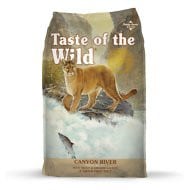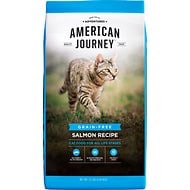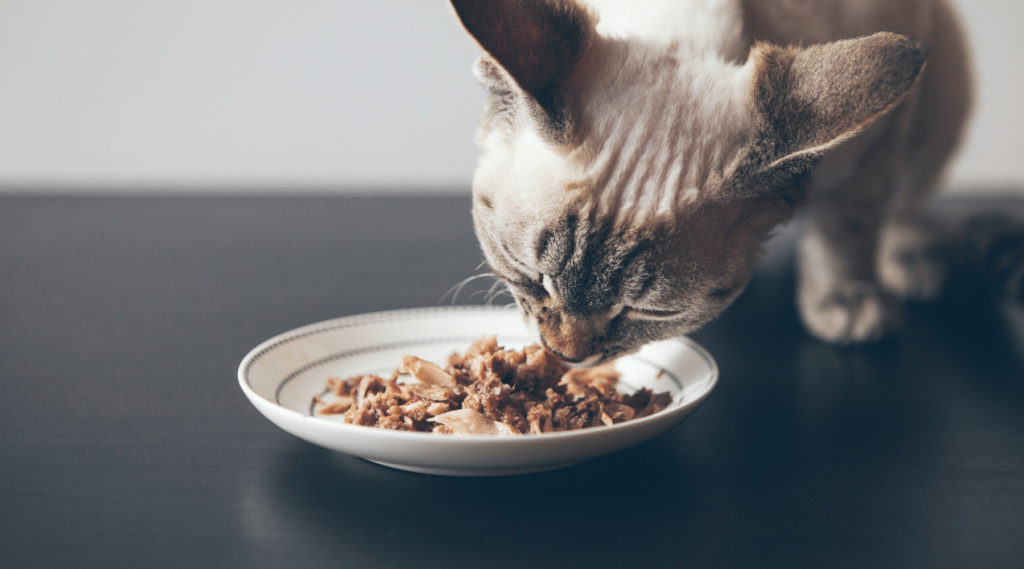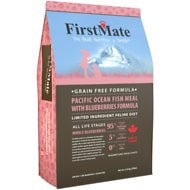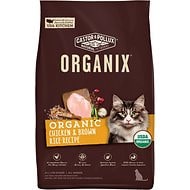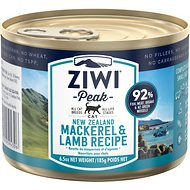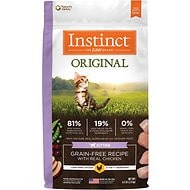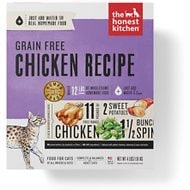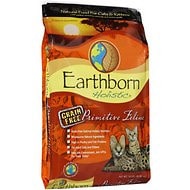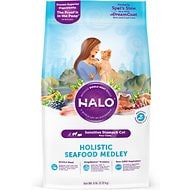Contents
- What Is The Best Cat Food For Smelly Poop?
- What Causes Foul Smelling Cat Poop?
- Simple Tips for Reducing Litter Box Odor
- What to Look for in a Good Cat Food for Smelly Poop
- How Do We Make Our Recommendations?
- The 10 Best Cat Foods for Smelly Poop
- 6 More Top-Rated Cat Foods for Smelly Poop
- Castor and Pollux Organix Chicken & Brown Rice Dry Food
- Ziwi Peak Mackerel & Lamb Recipe Canned Cat Food
- Instinct by Nature’s Variety Original Kitten Grain-Free Recipe with Real Chicken Dry Food
- The Honest Kitchen Grain-Free Chicken Recipe Dehydrated Cat Food
- Earthborn Holistic Primitive Feline Grain-Free Natural Dry Cat & Kitten Food
- Halo Holistic Seafood Medley Sensitive Stomach Dry Cat Food
- Frequently Asked Questions
Scooping the litter box is never a pleasant task but it is a necessary one. Think about how much you hate those few moments of being enveloped in that litter box smell while scoop clumps and shovel wet litter into the trash can. Now imagine being your cat and having to do your business in there several times a day. It doesn’t sound nice, does it?
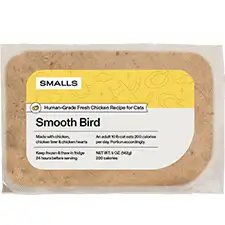
Smalls Human-Grade Ground Bird Fresh Cat Food
- Natural sources of taurine
- High in protein
There is no changing the fact that feces smell pretty bad. It isn’t the kind of odor you want to spend a lot of time around but, as bad as normal cat poop smells, it can sometimes smell even worse. Dietary issues, parasite infections, and even certain medications can turn up the dial on your cat’s litter box odor, taking it from unpleasant to downright awful. If your cat’s poop is stinking to high heaven – more than usual – you may want to talk to your veterinarian to see what’s causing the change.
In this article, we’ll explore the subject of litter box odor to determine what causes a cat to have smelly poop and what you can do about it. You’ll also receive some simple tips for reducing litter box odor and see our top picks for the best cat food for smelly poop.
What Is The Best Cat Food For Smelly Poop?
- Small Ground Bird Human-Grade Fresh Cat Food
- Taste of the Wild Canyon River Grain-Free Dry Cat Food
- American Journey Salmon Recipe Grain-Free Dry Cat Food
- FirstMate Pacific Ocean Fish Meal with Blueberries Limited
- Castor and Pollux Organix Chicken & Brown Rice Dry Food
- Ziwi Peak Mackerel & Lamb Recipe Canned Cat Food
- Instinct by Nature’s Variety Original Kitten Grain-Free Recipe
- The Honest Kitchen Grain-Free Chicken Recipe Dehydrated
- Earthborn Holistic Primitive Feline Grain-Free Natural Dry
- Halo Holistic Seafood Medley Sensitive Stomach Dry Cat Food
What Causes Foul Smelling Cat Poop?
Generally speaking, cat poop smells bad – it’s just a fact of life. It is completely normal for feces to smell unpleasant, but if your cat’s poop suddenly takes on a particularly strong or foul odor, there might be something wrong. Most cats poop at least once or twice a day and healthy stool is deep brown in color, solid in texture (not too hard or too soft) and might have a slight but not foul odor.
From time to time, you may notice changes in your cat’s litter box activity. Diarrhea is fairly common for cats and it often comes and goes on its own. In some cases, however, it can last for days, weeks, or months at a time, or it might come and go on a fairly regular basis. For healthy cats, diarrhea lasting 24 to 48 hours is unlikely to do any harm, but chronic diarrhea can be dangerous for older cats and kittens. Left untreated, chronic diarrhea can lead to dehydration. Some of the most common causes for diarrhea in cats including dietary changes, inflammatory bowel disease, parasites, colitis, and hyperthyroidism.
Diarrhea tends to be more odorous than healthy stools, but strong fecal odors can be linked to other problems as well. Here are some of the most common causes of litter box odor:
- Diet – It should be obvious that if your cat’s stool changes, it probably has something to do with his diet. Cats can develop allergies and sensitivities to certain ingredients that may not agree with his stomach, causing him to develop diarrhea, gas, and smelly stools.
- Bacteria – Your cat’s litter box is anything but clean, so you should expect there to be some bacteria. Certain bacteria can set up shop in the litter box, making it smell worse than it already does. Bacterial infections can also cause your cat to develop diarrhea, gas, and smelly stool.
- Parasites – Giardia and other intestinal parasites can affect your cat’s digestion, increasing his risk for gas, diarrhea, and chronically smelly feces. Other parasites that can have this effect include coccidia and trichomonas.
- Digestive Disorders – It should come as no surprise that digestive disorders can change your cat’s feces, and not for the better. Indigestion and malabsorption of nutrients can result in rancid smelling stools due to undigested or unabsorbed starches and fats in your cat’s diet.
- Medications – Certain medications and hormonal changes in your cat’s body can lead to changes in his digestion and his body’s chemical balance which could affect stool odor.
- Infection – Cats have anal glands which excrete a scent completely unique to your cat – that’s how he marks his territory. If those glands become infected, it can lead to an odorous discharge that ends up in your cat’s litter box and makes for a smelly mess.
Because there are a number of disorders that can lead to smelly poop in cats, you should talk to your veterinarian to obtain a diagnosis. You may have your suspicions about your cat’s diet or think that he has intestinal parasites, but your vet will be able to run tests to confirm or deny the issues listed above. Once your veterinarian has determined the underlying cause of the problem, you can start talking about what to do to resolve the issue. In some cases, the resolution may be quick and easy, but some problems take longer to remedy. It varies on a case by case basis.
Now that you have a better understanding of what causes foul smelling cat poop, you may be wondering how to treat it. In the next section, we’ll talk about treatment options and explore how changing your cat’s diet might help.
Simple Tips for Reducing Litter Box Odor
With your veterinarian’s help, you can determine the underlying cause of your cat’s smelly feces and from there talk about the options for how to get rid of cat poop smell. The first step in reducing litter box odor is treating the underlying cause of the odor. If your cat’s diet is to blame, switch to a different cat food. If he has a bacterial or parasite infection, your veterinarian will prescribe the necessary medication. Digestive disorders may require more long-term treatment, but there are some things you can do in the short-term to help reduce litter box odor.
Here are some simple steps for reducing litter box odor:
- Scoop the litter box at least once a day – the longer it stays dirty, the more the odor will pervade your house.
- Replace the litter in your litter box completely at least once a week – scooping only removes so much, so refresh your litter box to reduce odor.
- Clean your litter box at least once a week with soap and warm water then dry it before refilling.
- Try using litter deodorizers or baking soda in the litter box to help reduce odors.
- Switch to a different brand of litter that clumps better to lock in odor – you might even try a scented litter if your cat isn’t sensitive to fragrance.
- Move the litter box to a well-ventilated area – keeping it in a tight space will only concentrate the smell.
The best option in how to get rid of cat poop smell is to address the underlying cause of the issue. Depending what the cause is, it could be an immediate fix, or it might take a few weeks (or months). In the meantime, follow the tips above and consider making a change to your cat’s diet.
What to Look for in a Good Cat Food for Smelly Poop
Cats are obligate carnivores which means that their bodies are more efficiently adapted to processing animal ingredients than plant ingredients. A diet high in animal protein with animal-based sources of fat is the most digestible for your cat and will lead to reduced litter box odors. Keep in mind, however, that cats can develop food sensitivities which can affect digestion. It is up to you to identify your cat’s dietary requirements and to choose a cat food that meets those requirements.
Here are some of the things to look for in a good cat food for smelly poop:
- High-quality, natural ingredients. The odor of your cat’s stool has everything to do with his digestion. Switching to a diet made from higher quality natural ingredients makes it more digestible which will help cut down on stool odor.
- Real animal protein. There is some thought that high-protein diets lead to increased litter box odor but it is more likely that the quality of the protein is what matters. Choose a cat food recipe that contains a real source of animal protein as the main ingredient – avoid by-products.
- Healthy animal-based fats. Cats have an easier time digesting animal-based ingredients, so a diet high in plant-based fats (especially low-quality fats and oils) may not be completely digested. The leftover fat will pass in your cat’s stool and can go rancid, making odors worse.
- Digestible carbohydrates. Again, digestibility is key when it comes to regulating your cat’s digestion and reducing litter box odors. Look for nutritious, digestible carbohydrates in limited quantities such as whole grains, fruits, and vegetables.
- Limited number of ingredients. Food allergies and sensitivities can lead to digestive issues like foul smelling stool, so try a diet made with fewer ingredients to reduce the risk of triggering an allergy or sensitivity.
Every cat is different, so you’ll need to get your veterinarian’s advice to determine how best to treat the underlying cause of your cat’s feces odor. In many cases, making dietary changes is a key component of treatment. Read on to see our picks for the best cat food to control feces odor.
How Do We Make Our Recommendations?
Balanced nutrition is important for your cat’s health and digestion. If you want to keep your cat healthy for the long term, the best thing you can do is buy the highest quality cat food you can consistently afford. If your cat has digestive issues, this can be tricky. Fortunately, we’ve compiled a detailed list of high-quality cat foods to help you start your search. But don’t just take our word for it with these cat foods – know that we’ve done the research and we wouldn’t recommend anything we wouldn’t be happy to feed our own cats. If it’s good enough for our cats, it’s good enough for yours!
Here are some of the requirements for a cat food to receive our recommendation:
- A source of high-quality animal protein as the first ingredient
- At least 30% crude protein for kittens and at least 26% for adults
- A minimum of 9% crude fat for kittens and adults
- A balance of omega-3 and omega-6 fatty acids, primarily from animal sources
- A rich blend of nutrients from natural sources and supplements, as needed
- Limited carbohydrate content from digestible sources (like whole grains and veggies)
- No low-quality fillers, by-products, or artificial additives (preservatives, dyes, or flavors)
The 10 Best Cat Foods for Smelly Poop
Your cat’s litter box will never smell like daisies, but if you can’t smell it from a few feet away, you should be pretty satisfied. In addition to scooping the box regularly and providing enough litter boxes for the number of cats you have you might consider increasing the quality of your cat’s food to help cut down on litter box odor even more. Here are our picks for the best cat food to make poop smell less:
| Our 2024 Picks: Best Cat Foods for Smelly Poop | |||
Small Ground Bird Human-Grade Fresh Cat Food
|
CHECK PRICE | ||
Taste of the Wild Canyon River Grain-Free
|
CHECK PRICE | ||
American Journey Salmon Recipe Grain-Free
|
CHECK PRICE | ||
FirstMate Pacific Ocean Fish Meal with Blueberries
|
CHECK PRICE | ||
Castor and Pollux Organix Chicken & Brown Rice
|
CHECK PRICE | ||
Ziwi Peak Mackerel & Lamb Recipe Canned Cat Food
|
CHECK PRICE | ||
Instinct by Nature’s Variety Original Kitten Grain-Free
|
CHECK PRICE | ||
The Honest Kitchen Grain-Free Chicken Recipe
|
CHECK PRICE | ||
Earthborn Holistic Primitive Feline Grain-Free
|
CHECK PRICE | ||
Halo Holistic Seafood Medley Sensitive Stomach
|
CHECK PRICE | ||
Small Ground Bird Human-Grade Fresh Cat Food
Overall Best Cat Food for Smelly Poop: If you are looking for a healthy, high-quality recipe to boost your cat’s digestion and reduce litter box odor, consider Smalls. This is a fresh pet food company that uses high-quality, natural ingredients in protein-rich formulas made in small batches. Not only is this food complete and balanced in terms of nutrition, but it is made and delivered fresh to maximize digestibility. Choose from two different protein options, knowing that every recipe is rich in natural sources for key nutrients with probiotics for healthy digestion. To order Smalls, simply fill out a profile for your cat online, choose from the recipe options, and start receiving shipments sent right to your door.
- Pros: High-quality natural ingredients, produced in small batches, real sources of animal protein, digestible carbohydrates, complete and balanced nutrition, probiotics for digestion
- Cons: Significantly more expensive than average cat food, only two protein options to choose from
Taste of the Wild Canyon River Grain-Free Dry Cat Food
Most Popular Cat Food for Smelly Poop: Most cats don’t require a prescription diet for smelly poop – all they really need is something made with high-quality natural ingredients to increase digestibility. Because there are so many cat foods out there that meet this description, you might have a hard time picking one. If you’re not sure what to get, you can always go with a popular brand like Taste of the Wild. This brand uses premium roasted meats and grain-free carbohydrates to ensure complete and balanced nutrition in all of their recipes with maximum digestibility. This particular recipe contains trout and ocean fish meal as the top two ingredients with sweet potatoes and potatoes as the primary carbohydrates. You’ll also find fresh fruits and vegetables as rich sources of key nutrients with supplements to ensure nutritional balance.
- Pros: High-quality natural ingredients, rich in animal protein, fresh fruits and vegetables, highly digestible, chelated minerals and probiotics, novel sources of animal protein
- Cons: Contains some plant proteins (potato and pea protein), main source of fat is plant-based
American Journey Salmon Recipe Grain-Free Dry Cat Food Recipe
Most Affordable Cat Food for Smelly Poop: If your cat has smelly poop, you want to increase the quality of his diet to boost his digestion. Unfortunately, high-quality cat food can be fairly expensive. If you’re looking for a recipe that is loaded with real, whole food ingredients but won’t break the bank, consider this American Journey Salmon Recipe Grain-Free Dry Cat Food. This formula is very affordable for a recipe that includes numerous sources of premium animal protein. It contains fresh salmon as the main ingredient with salmon meal and menhaden fish meal for supplemental sources of protein. For healthy fats, this recipe contains canola oil and flaxseed to balance out the natural fats from the fish ingredients. Overall, this recipe provides 40% protein and 15% fat at 410 calories per cup.
- Pros: Rich in real animal protein, affordable price for quality, digestible grain-free ingredients, fresh fruits and vegetables, rich in fiber for healthy digestion, probiotic supplements
- Cons: Contains some plant protein (pea protein), could be higher in fat content
FirstMate Pacific Ocean Fish Meal with Blueberries Limited Ingredient Diet Grain-Free Dry Cat Food
Best Cat Food for Smelly Poop and Sensitive Stomach: Food allergies and sensitivities can mess with your cat’s digestion and cause problems like smelly poop. If your cat is allergic or sensitive to common cat food ingredients, you may want to try a limited ingredient diet like this FirstMate formula. It features a single source of high-quality animal protein (Pacific Ocean fish meal) with chicken fat as a digestible, nutritious source of essential fatty acids. This recipe contains a limited number of natural ingredients including potato as a grain-free carbohydrate and blueberries as an antioxidant-rich source of natural nutrients. This formula is supplemented with chelated minerals for optimal nutrient absorption and is complete and balanced for all life stages.
- Pros: Single source of novel animal protein, limited number of ingredients, protein-rich and highly digestible, nutritious animal fat, complete and balanced, chelated mineral supplements.
- Cons: Fairly expensive compared to average kibble, very high in calorie content
6 More Top-Rated Cat Foods for Smelly Poop
All cat foods are not created equal and the best cat food for one cat might not be the perfect choice for yours. If you don’t think any of the recipes reviewed above are the right choice for your cat, don’t worry – there are plenty of others out there. Here are 6 more picks for the best cat food to control feces odor:
Castor and Pollux Organix Chicken & Brown Rice Dry Food
Best Dry Cat Food for Smelly Poop: When it comes to finding the best dry cat food for smelly poop, you can’t do much better than a high-quality cat food made with organic ingredients. This Castor & Pollux Organix Chicken & Brown Rice recipe features an assortment of organic ingredients including chicken, chicken meal, oatmeal, peas, brown rice, and barley. Whole food ingredients like these deliver a healthy dose of nutrition for your cat while making the entire recipe more digestible. This recipe also contains plenty of omega 3 and omega 6 fatty acids for healthy skin and coat, plus it is fortified with essential vitamins and minerals to make sure it is complete and balanced for your cat.
Ziwi Peak Mackerel & Lamb Recipe Canned Cat Food
Best Wet Cat Food for Smelly Poop: If your cat prefers wet food, or if you’re looking for a recipe that is rich in protein and very low in carbohydrates, try this recipe from Ziwi Peak. This formula is one of our top picks for the best wet cat food for smelly poop because it is highly digestible, made with a limited number of premium natural ingredients. It features fresh mackerel as the main ingredient with fresh lamb and several lamb organ meats for supplemental protein and rich natural flavor. This recipe contains chickpeas as the only carbohydrate ingredient and the formula is supplemented with essential vitamins and chelated minerals to ensure complete and balanced nutrition with optimal digestibility.
Instinct by Nature’s Variety Original Kitten Grain-Free Recipe with Real Chicken Dry Food
Best Kitten Food for Smelly Poop: Feeding your kitten well is an important step in the right direction toward long-term health and wellness. The quality of your kitten’s diet matters just as much as the protein and calorie content if you want him to grow up strong and healthy. This Instinct by Nature’s Variety Original Kitten Grain-Free Recipe with Real Chicken contains 80% real animal ingredients and fats with 19% fruits, vegetables, and other wholesome ingredients. As our top pick for the best kitten food for smelly poop, you can rest assured that it is highly digestible, complete and balanced, and made with premium quality natural ingredients. Overall, it provides 42.5% protein and 22.5% fat with 557 calories per cup.
The Honest Kitchen Grain-Free Chicken Recipe Dehydrated Cat Food
This dehydrated cat food recipe from The Honest Kitchen is a great choice if you can’t afford fresh food, but you still want to give your cat the same quality nutrition. Because this food is dehydrated instead of cooked at high temperatures, it retains more of its original nutritional integrity. This food features real chicken as the main ingredient and a single source of premium animal protein. It also contains grain-free carbohydrates like potatoes, sweet potatoes, and flaxseed. Overall, this is a highly digestible recipe that delivers premium-quality nutrition that is both complete and balanced.
Earthborn Holistic Primitive Feline Grain-Free Natural Dry Cat & Kitten Food
Switching your kitten over to a new recipe when he becomes an adult can cause unnecessary digestive upset. If you want to start your kitten off well and avoid this hassle, try a recipe that is complete and balanced for both kittens and adult cats. This Earthborn Holistic Primitive Feline recipe features real animal proteins like chicken meal and turkey meal with fresh fruits and vegetables to provide natural sources for key vitamins and minerals. This recipe is protein-rich, highly digestible, and it provides all of the nutrients cats and kittens need for complete and balanced nutrition.
Halo Holistic Seafood Medley Sensitive Stomach Dry Cat Food
If your cat has a sensitive stomach that causes smelly poop, this holistic seafood medley could be a good choice. It features real, whole whitefish and salmon as the main ingredients with no rendered meat meal. It is made with novel animal proteins to reduce sensitivity and allergies, with real grains to promote digestibility. This recipe is supplemented with chelated minerals to ensure optimal nutrient absorption, as well as plenty of fiber and probiotics for healthy and regular digestion.
Frequently Asked Questions
- What causes foul smelling cat poop? When it comes to smelly poop in cats, there can be a variety of different causes. In some cases, it is a temporary issue where the cat eats something that doesn’t agree with it and develops gas or diarrhea. For more chronic issues, it could have something to do with the cat’s everyday diet. Food allergies and sensitivities can manifest with digestive symptoms in some cats, so you might need to change your cat’s diet. Other potential causes for smelly poop include bacterial or parasite infections, anal gland infections, irritable bowel syndrome, or it could be caused by hormonal changes or medication.
- How do you know if your cat has a parasite? Intestinal parasites can irritate your cat’s digestive tract and lead to a variety of symptoms including smelly poop. Some of the most common intestinal parasites in cats include roundworms, hookworms, tapeworms, whipworms, and stomach worms as well as organisms like giardia and toxoplasma. On top of smelly poop, common symptoms of parasites in cats include unexplained weight loss, distended stomach, changes in fur condition, changes in bowel habits, visible worms in stool, and unusual behavior like lethargy and the cat dragging its bottom on the carpet.
- Should I take my cat to the vet for diarrhea? Diarrhea is actually fairly common in cats, so it is not something to be immediately alarmed about. It can happen if your cat eats something that doesn’t agree with it or for a variety of other reasons. Diarrhea that lasts for 24 to 48 hours is generally not a big concern except in older cats and young kittens because it can lead to dehydration. If your cat’s diarrhea is black or bloody, or if he also experiences fever, vomiting, and lethargy, you should contact your veterinarian immediately.
- How often should you change cat litter? The frequency with which you change your cat’s litter depends on several factors. First, you should make sure you have at least one litter box per cat, plus one extra. If you don’t have enough litter boxes for your cats to choose from, they may not use the box consistently or you may have to scoop it more often. The type of litter you use also determine how often you scoop, as clumping litter tends to be easier to scoop whereas non-clumping litter needs to be replaced entirely. Generally speaking, you should scoop twice daily to control litter box odor and replace the litter every one to two weeks.
- Why does my cat not cover her poop? Cats have an instinct to cover their feces, that’s why litter box training works so well. There are times, however, when a cat might not cover its feces. In some cases, it is a matter of the cat using it as a form of marking his territory. In other cases, it may be that the cat doesn’t like the feel of the litter on its paws. This is more common with declawed cats because pawing at the litter is uncomfortable.
Your cat’s litter box habits are probably not something you want to spend a lot of time thinking about. When litter box odor starts to pervade your entire home, however, you may not have a choice. Though smelly poop may be unpleasant, it isn’t something you should ignore – especially if it is a sudden change from the norm with your cat. Significant changes in your cat’s behavior, appetite, or digestion should be addressed with your veterinarian.
Depending what your vet says is the cause for your cat’s smelly poop, you might want to consider a change in diet. There are many cat foods out there that could reduce your cat’s litter box odor simply by improving the quality of his diet and its digestibility. If you’re still not quite sure what you’re looking for, try one of our top picks reviewed above.

